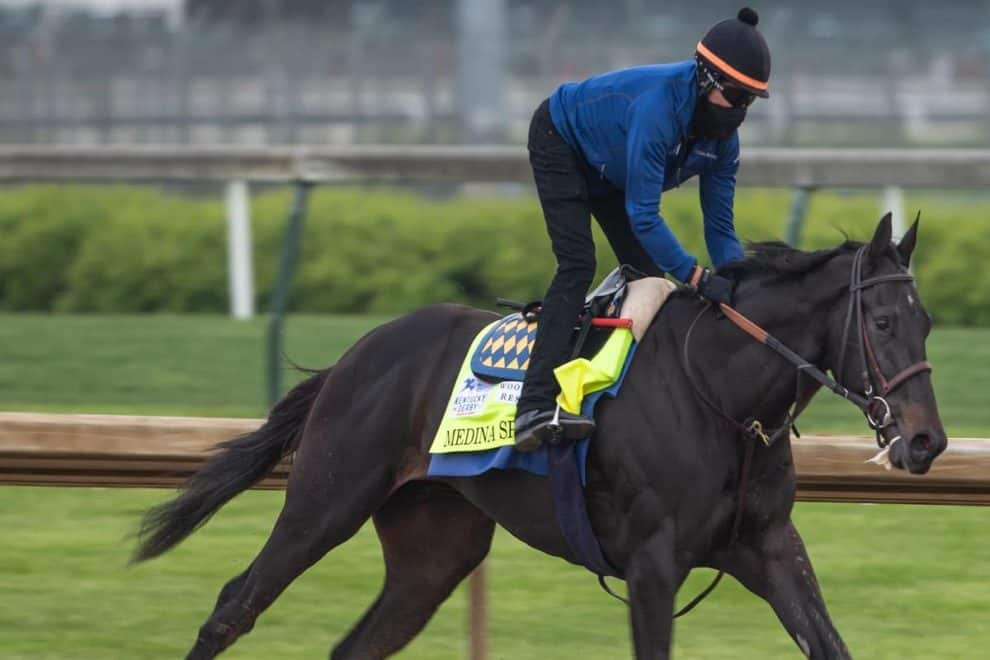
- A Kentucky judge has ordered the state’s horse racing regulators to allow additional testing on a urine sample from Medina Spirit.
- The judge’s order should determine if Medina Spirit’s failed drug test after the Kentucky Derby was the result of a skin ointment as asserted by Bob Baffert.
- The contention of Medina Spirit’s connections is that the source of the betamethasone should be a ‘mitigating factor’ in adjudicating the case.
In what appears to be a legal victory for Bob Baffert and Medina Spirit’s connections a Kentucky judge has ordered state racing regulators to allow further testing on the horse’s urine sample. Franklin Circuit Court Judge Thomas Wingate ruled that the Kentucky Horse Racing Commission (KHRC) must allow testing for three specific subjects–all of which are active ingredients in the skin ointment that Medina Spirit’s connections claim was the source of the positive test for betamethasone following the Kentucky Derby.
The argument from lawyers representing trainer Bob Baffert and horse owner Amr Zedan have stressed that additional testing is necessary to affirm that the positive betamethasone test is due to the aforementioned skin ointment. Their contention is that the source of the positive test should be considered a ‘mitigating circumstance’ in the KHRC’s adjudication of the positive test. So far the KHRC has only confirmed the positive test but have not issued any type of ruling or for that matter scheduled a hearing.
The judge’s ruling spells out the logistics of additional testing in great detail as described by the Daily Racing Form:
Under the judge’s ruling, two commission representatives and two representatives of the horse’s connections will be required to accompany the sample on a flight to upstate New York, where the sample is being tested. After arriving at the laboratory, the sample will be divided into two batches, with 20 milliliters reserved for testing and the remainder, approximately 5 milliliters, given to the KHRC as a reserve, the ruling states.
The presumption is that Medina Spirit will eventually be disqualified as the winner of the May 1 Kentucky Derby and the second place horse, Mandaloun. Mandaloun won the Grade 2 Risen Star at Louisiana’s Fairgrounds Race Course before slumping to a disappointing sixth in the Grade 2 Louisiana Derby. After a break following Mandaloun’s Kentucky Derby runner up performance he returned to action last weekend with a victory–albeit a strange one–in the Pegasus Stakes at Monmouth.
Obviously, Baffert et. al hope to preserve Medina Spirit’s Kentucky Derby win but that will be a tough task under Kentucky racing rules which require a disqualification for a positive test for betamethasone. Betamethasone is sypically injected into a horse’s joints to ease swelling and pain. Baffert’s legal team will try and make the case that the DQ would not be required for the ‘incidental contamination’ from the skin ointment as it is for an injection of betamethasone. Kentucky’s regulatory framework for horse racing–and specifically as it relates to medication and withdrawal guidelines–is very complex so it remains to be seen if Baffert’s lawyers can find a way to justify the distinction they claim.
What would happen should Baffert’s contention that the betamethasone came from the skin ointment is validated is twofold: it would force the KHRC to rule on the matter and it would likely provide Baffert with a good deal of leniency in whatever sanction they decide to hand down. As it stands, the KHRC looks somewhere between negligent and vindictive in the way they’ve handled the Medina Spirit situation. At the very least, the ruling does suggest that the legal recourse from Medina Spirit’s connections is being taken seriously by the courts in Kentucky. There is also a pending legal action against the New York Racing Association (NYRA) relative to their ‘temporary ban’ of Baffert from the racetracks under their auspices.









